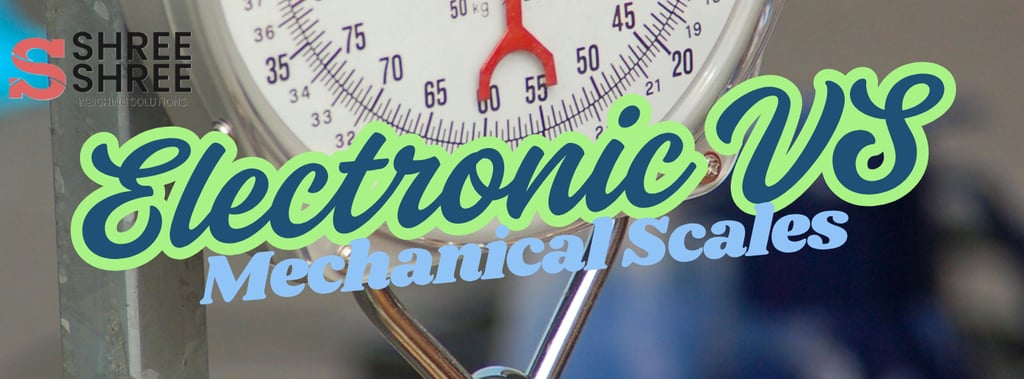Electronic vs. Mechanical Weighing Scales: What’s Best for You?
When it comes to selecting a weighing machine, businesses often face a common dilemma: electronic vs. mechanical weighing scales. Both have their pros and cons, but choosing the right one depends on your business needs, budget, and precision requirements. At Shree Shree Weighing Solutions, a trusted weighing scale manufacturer in Ahmedabad, we help you understand the key differences and which option suits your operations best.
5/3/20252 min read


1. What Are Mechanical Weighing Scales?
Mechanical scales use springs or levers to determine weight and display results via a dial or needle. They don’t require electricity, making them ideal for simple tasks in places like vegetable markets or small shops.
Pros:
No need for power or batteries
Simple and robust
Cost-effective for basic use
Cons:
Limited accuracy
No data storage or digital output
Wear and tear reduces precision over time
2. What Are Electronic Weighing Scales?
Electronic or digital weighing scales use load cells and microprocessors to display weight on an LED/LCD screen. They are widely used in retail, industrial, and commercial sectors due to their precision and smart features.
Pros:
High accuracy and sensitivity
Quick digital readout
Advanced features like tare, unit conversion, and data integration
Sleek and modern design
Cons:
Needs power (battery or electricity)
Slightly higher initial cost
Can be sensitive to voltage fluctuations (solved by good quality brands like ours)
3. Accuracy Comparison
Accuracy is where electronic scales clearly outshine mechanical ones. For example, in pharma or jewelry, precision up to 0.01g is crucial—something only digital scales can offer.
4. Durability & Maintenance
Mechanical scales, with fewer electronics, can be more rugged in outdoor or rough environments. However, modern digital industrial scales made by us in Gujarat are now equally durable, with features like water resistance and overload protection.
5. User Interface & Experience
Digital scales offer multi-lingual interfaces, illuminated displays, and user-friendly controls. Some also come with touchscreens and Bluetooth/WiFi options—making your operation smoother and more efficient.
6. Industry Applications
Mechanical Scales: Small general stores, street vendors, remote areas with no electricity.
Electronic Scales: Supermarkets, laboratories, warehouses, manufacturing units, logistics, and more.
7. Pricing & ROI
Though electronic scales are more expensive upfront, their precision and speed offer a higher return on investment through reduced errors and faster transactions.
Conclusion: Which Is Right for You?
If you need basic, budget-friendly weighing and are in an environment without stable electricity, go for a mechanical scale. But if you're looking for precision, speed, and smart features, an electronic weighing scale is the clear winner.
At Shree Shree Weighing Solutions, we manufacture and supply both types of weighing machines in Ahmedabad and across Gujarat. Our team can help assess your needs and suggest the perfect fit.
Need Help Choosing?
📞 Call us today or walk into our Ahmedabad showroom for a live comparison and demo.
🔧 We also offer calibration, repair, and AMC services across Gujarat.
